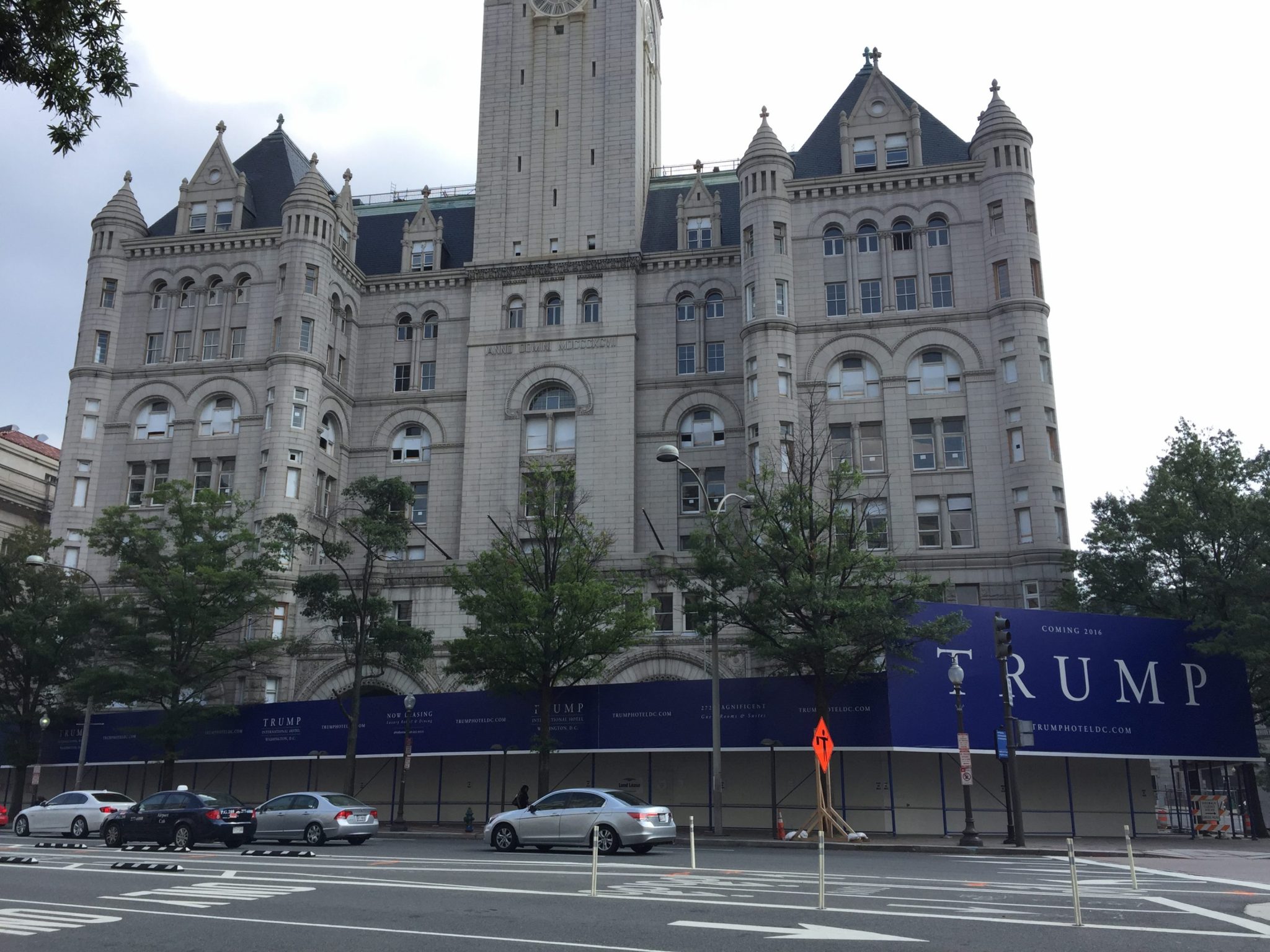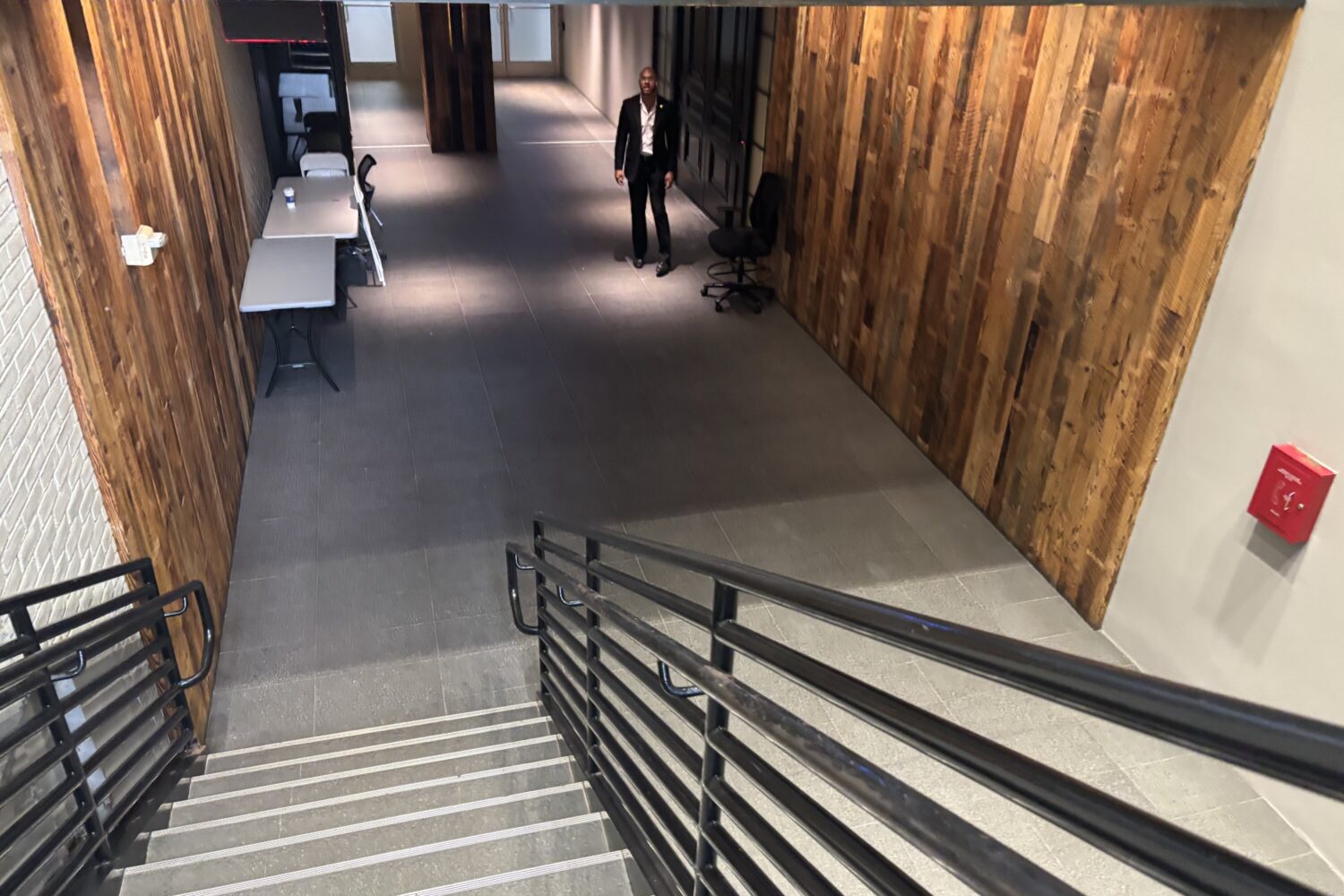On July 8 last year, José Andrés dropped the big news in a Washington Post story: He was backing out of a deal to open the flagship restaurant in Donald Trump’s DC luxury hotel following the presidential candidate’s controversial remarks about Hispanic immigrants.
“I can’t believe I have to start over,” Jeffrey Pollak recalled thinking when a colleague forwarded him the article.
As managing principal and vice president for local real estate brokerage and design firm Streetsense, Pollak was responsible for finding retail and restaurant tenants for the hotel. The next day, he would also be back to square one with a second space, as celebrity chef Geoffrey Zakarian pulled plans to open his restaurant, The National, in the northwest corner of the Old Post Office building. The Trump organization went on to sue both Andrés and Zakarian for breach of contract, and the restaurateurs countersued.
Beyond the ongoing legal battle, another drama was playing out as the Trump camp scrambled to find replacement restaurants. Depositions from May and June recently obtained by Washingtonian of Pollak, Trump family members, and several others in the Zakarian lawsuit reveal new details about the fallout. (All quotes in this story come from the deposition transcripts.)
In the immediate aftermath, Streetsense’s partners were starting to question their company’s own relationship with the Trumps.
“I think this issue has evolved to a point where we need to discuss if we want to maintain Trump as a client,” Streetsense co-CEO and vice chairman Guy Silverman wrote to his partners in an email that was quoted during Pollak’s deposition. “The public outcry continues to grow. It is toxic as of today. Not sure how long before it gets better, at least not until he drops out of the race and probably not then either. Not sure what it says about us or culture to the outside world, and most importantly to the staff. At least worthy of a conversation.”
Pollak agreed that it was worth a conversation but he wasn’t too concerned about the public outcry. He emailed back: “Right now my strategy is, [David Orowitz, Trump’s Senior Vice President of Acquisitions and Development] and Ivanka [Trump], I have your back. When everyone else is running, we support the project. We work for Ivanka is my rationale. The children have been silent since this went down. I think if we stand with Ivanka, who called me directly after this, and David Orowitz, and help them in a time of need, it may pay off in the long run… We don’t have to be very obvious with our continue involvement for now.”
By not being “very obvious,” Pollak explains in the deposition that that meant not actively publicizing Streetsense’s relationship with the Trump hotel: “We don’t have to have it on our website, we don’t have to PR it, just continue to do the business without having it be front and center.”
And so after further discussion, the Streetsense team ultimately decided to stick with the Trump project, and Pollak got back to trying to find replacement restaurants.
At that point, though, Trump’s controversial comments about immigrants had already poisoned the well among some other restaurateurs. Cathal Armstrong, Fabio Trabocchi, and Eric Ziebold were all included on a list of potential tenants next to notes that say “likes project, but recent press is too much to swallow.”
Other national names were also turned off in the wake of Trump’s comments, including Stephen Starr, Richard Sandoval, and Crafted Hospitality, Tom Colicchio’s restaurant group.
“All the chefs know each other, and I think they were just staying away from it at the time this was all going down… They were all very politically correct and said, ‘We’re avoiding it for political reasons,’” Pollak says in the deposition.
Political controversy wasn’t the biggest obstacle in finding replacement tenants, though. Timing was. The Trumps were adamant that the restaurants would open on the same date as the hotel (now Sept. 12). For many restaurateurs, that didn’t leave enough time to negotiate a deal and finish the buildout. After all, the Zakarian and Andrés leases each took nearly two years to finalize.
Streetsense expressed its concerns about the limited timeframe to the Trump team. “‘Maybe we’ll get lucky,’” Pollak recalls them saying. “‘Go hit the market and see what we can come up with.’”
The Trumps, not Streetsense, brought in BLT Prime, the steakhouse that will ultimately replace Andrés’ restaurant in the center of the Old Post Office building. BLT has restaurants in Trump hotels in Miami and Honolulu, so a relationship already existed.
Pollak, however, thought BLT Prime was a mistake. There was already a BLT Steak, a very similar restaurant from the same owners, several blocks away. “It’s just been done. My job was to create a great experience in the lobby, and I think there was better opportunities,” Pollak says in his deposition. “I think half the names on that list could have been better opportunities.”
(Also Streetsense wouldn’t get a commission if BLT Prime was signed, because the Trump team didn’t use the company to secure the deal.)
Pollak says he thought a restaurant with a big-name chef would be a better fit. (At the time, celebrity chef David Burke was not affiliated with BLT Prime.) He pushed instead for a deal with Bryan Voltaggio, who initially had talks with the Trump hotel before Andrés signed a lease.
“We got very close to finishing a deal, and Voltaggio’s group changed the economics at the end of the day, at the eleventh hour,” Pollak says of those early negotiations before Andrés.
After Andrés and Zakarian backed out of the hotel, Voltaggio expressed interest in at least having some conversations with the Trump team. But it never went anywhere. “He was concerned about word getting out that he was going to be looking at or talking to Trump,” says his broker John Asadoorian, who was deposed as an expert witness for Zakarian’s team.
“He doesn’t want the current agitation to tarnish him,” Asadoorian wrote in an email to Pollak.
The Trump hotel ultimately locked down BLT Prime with a management deal rather than a lease, which was not the hoteliers’ preference. In a management deal, the hotel builds and owns the restaurant and then pays an outside party to manage it. That means the hotel’s revenue rises and falls with the success of the restaurant, rather than simply receiving a flat rent.
Both Zakarian and Andrés had leases and were planning to spend several million dollars each on their buildouts. But with limited time before opening, the Trumps conceded a management deal to BLT Prime. Not having a restaurant in the lobby was not really an option.
When it came to replacing Zakarian’s restaurant in the northwest corner of the building, however, they steadfastly insisted only on a lease.
“Most restaurateurs want to do a management agreement,” says Orowitz, the senior VP of acquisitions and development for Trump, in his deposition. “You’re paying them instead of them paying you. We didn’t want to open that door even, because we felt people would want to go through that door.”
That ruled out a number of other restaurant groups that were interested in the hotel. Passion Food Hospitality, for one, had some initial talks with the Trumps but only wanted a management deal.
The BLT team was also interested in the northwest corner of the hotel for a second eatery, BLT Market, which Donald Trump Jr. describes as “slightly down market of BLT Prime.” Aside from the fact they also wanted a management deal, Trump Jr. thought the two concepts would be too similar.
The Trump team also had conversations with Spike Mendelsohn but weren’t thrilled by his ideas. “His initial theme was something along the lines of, you know, Murderer Bay, which I guess is what the area was called prior to the construction of the Old Post Office,” Trump Jr. says. Murder Bay, which we now know as Federal Triangle, was once a hub for crime and prostitution. “It was probably not a theme we would have wanted on the corner of Pennsylvania Avenue.”
Meanwhile, Raymond Flores, an acquisitions and development associate for the Trump hotel, called Mendelsohn’s group “scatter-brained” in his deposition. “They were sort of all over the place. They didn’t commit. They didn’t have a concept to slot in here. There was some celebrity attached to his name, but it wasn’t as great as José Andrés and probably not as great as Zakarian,” he says.
A number of other deals were also entertained, but the closest the Trumps seemed to get to a lease for the former Zakarian space was with Zavino, a Philadelphia-based pizzeria. That, too, fell through: “We didn’t think he had the financial wherewithal to do the deal,” Pollak says.
In the end, the would-be restaurant will become a large conference room. The Trumps figured the buildout wouldn’t take as long or be as expensive as a restaurant.
It doesn’t look likely that the Trumps will convert the space into a restaurant in the future either. While they’re not ruling anything out, they’re not keen on the noise and disruption that might cause. “It’s sort of a worst-case scenario to build it out,” Trump Jr. says.
Ivanka Trump says in her deposition there’s been discussion about using the patio of the northwest corner for a seasonal outdoor bar and seating area that the hotel would run. If that happens, it wouldn’t be until next year.
Asked about potential food, Ivanka says the intention is for it to be a bar, not a restaurant.
“So I would imagine nuts and crackers.”















